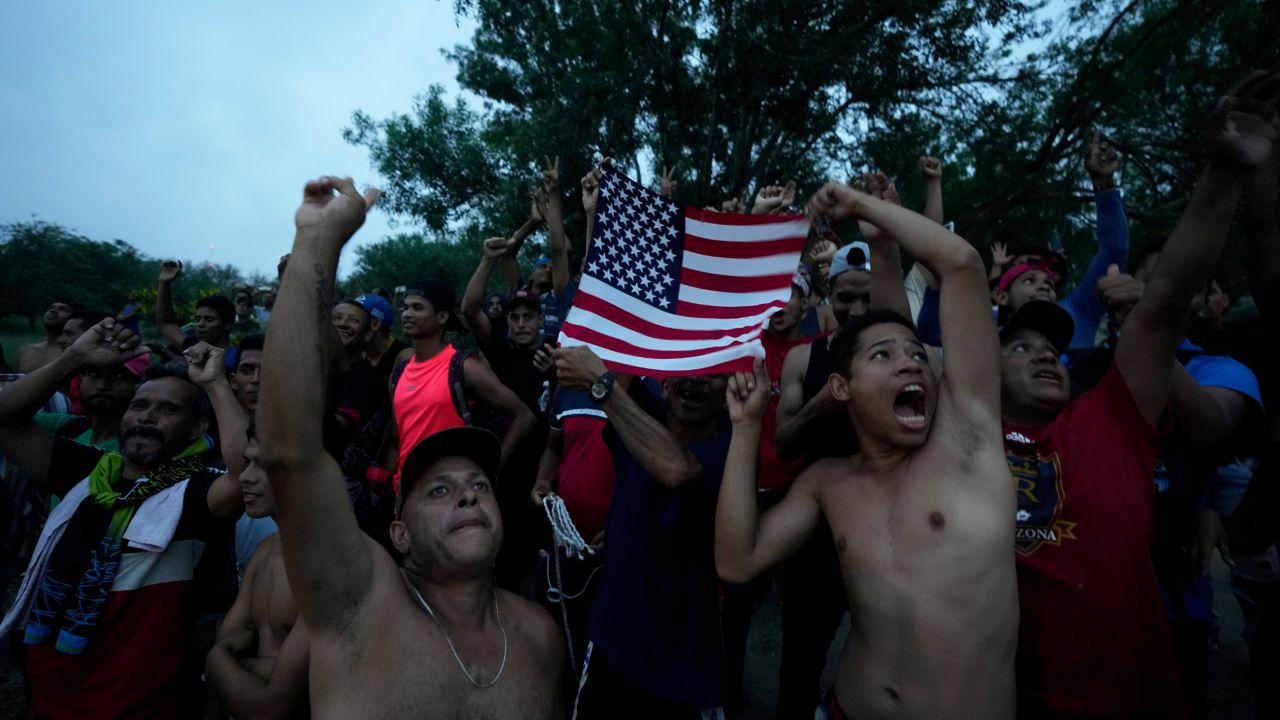MEXICO CITY (AP) — Mexico’s president said Friday that he is willing to help out with a surge of migrants that led to the closure of border crossings with the United States, but he wants the U.S. government to open talks with Cuba and send more development aid to migrants' home countries.
The comments by President Andrés Manuel López Obrador came a day after the U.S. announced that a delegation of top U.S. officials would visit Mexico for talks on how to enforce immigration rules at the two countries’ shared border.
López Obrador confirmed that U.S. officials want Mexico to do more to block migrants at its southern border with Guatemala, or make it more difficult to move across Mexico by train or in trucks or buses, a policy known as “contention.”
But the president said that in exchange he wanted the United States to send more development aid to migrants' home countries, and to reduce or eliminate sanctions against Cuba and Venezuela.
“We are going to help, as we always do,” López Obrador said. “Mexico is helping reach agreements with other countries, in this case Venezuela.”
“We also want something done about the (U.S.) differences with Cuba,” López Obrador said. “We have already proposed to President (Joe) Biden that a U.S.-Cuba bilateral dialogue be opened.”
“That is what we are going to discuss, it is not just contention,” he said at his daily morning press briefing.
Mexico is apparently offering to negotiate with Venezuela, whose people make up a large part of the surge of migrants at the U.S. southwestern border. That surge has led U.S. officials to pull immigration officers away from two Texas border rail crossings that are vital to Mexico’s economy.
López Obrador has long opposed U.S. sanctions on Cuba, whose migrants are also streaming to the U.S. border. And the Mexican president has long pressed the United States to contribute to a tree-planting program and to youth scholarship and apprentice programs that he has been pushing for Central America.
López Obrador said the development aid will help stem residents' need to migrate.
The Mexico-U.S. meetings come as Republican and Democratic lawmakers are debating border policy changes as part of a larger conversation over U.S. assistance for Ukraine and Israel, which are top foreign policy priorities for the White House.
Pressure mounted on Mexico following the closure of two railroad crossings in Texas earlier this week. U.S. officials said personnel assigned to the locations needed to be redeployed to help with large numbers of migrants illegally crossing the border. Mexican businesses warned the closures were hampering trade.
López Obrador spoke by telephone with Biden on Thursday and agreed that additional border enforcement was needed so the crossings can be reopened, White House national security spokesman John Kirby said.
Kirby said Biden asked Secretary of State Antony Blinken, Homeland Security Secretary Alejandro Mayorkas and White House Homeland Security Adviser Liz Sherwood-Randall to travel to Mexico for talks with López Obrador and his team.
A U.S. official said the trip would likely happen the Wednesday after Christmas.
“Their visit will really be about getting at the migratory flows and talking to President López Obrador and his team about what more we can do together,” Kirby said at a White House briefing.
Mexican companies are so eager for the border points to reopen that the leader of the Industrial Chamber of Commerce wrote on his social media accounts late Wednesday that a deal had been brokered to get them reopened. A U.S. Embassy spokesperson quickly denied that, saying they remained closed.
The Mexican Employers’ Association described the closure of railroad crossings into Eagle Pass and El Paso, Texas, as a “failure of migration policy.” The organization said the situation was causing losses of $100 million per day in delayed shipments.
Mexico receives much of the corn and soy products it needs to feed livestock on trains from the United States. Auto parts and automobiles also frequently are shipped by rail in Mexico.
“We energetically but respectfully call on the governments of Mexico and the United States to address the migration crisis which is affecting the flow of goods, given that this measure only damages the economies of both nations,” the association wrote in a statement.
U.S. Customs and Border Protection said Sunday the decision was made “in order to redirect personnel to assist the U.S. Border Patrol with taking migrants into custody.”
But is also appeared the U.S. government wants Mexico to crack down on migrants riding rail cars to the U.S. border.
Elsewhere, the Lukeville, Arizona, border crossing is closed, as is a pedestrian entry in San Diego, while more officials are assigned to the entry points. Illegal crossings at the U.S. southwestern border topped 10,000 on some days this month, an unusually high number.




)


